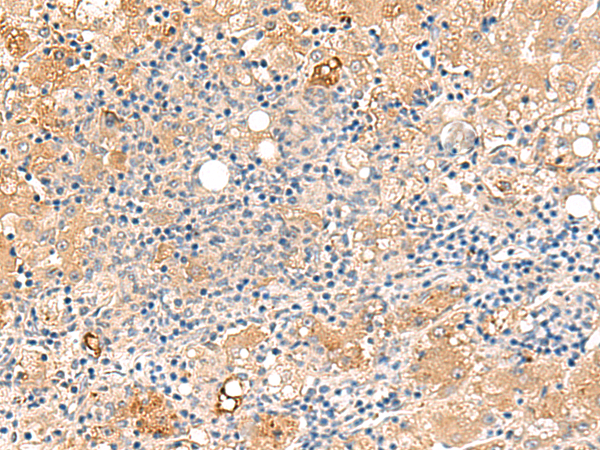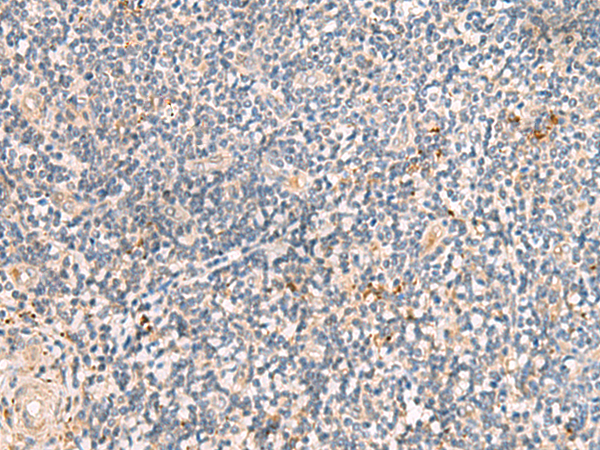


| WB | 咨询技术 | Human,Mouse,Rat |
| IF | 咨询技术 | Human,Mouse,Rat |
| IHC | 1/50-1/300 | Human,Mouse,Rat |
| ICC | 技术咨询 | Human,Mouse,Rat |
| FCM | 咨询技术 | Human,Mouse,Rat |
| Elisa | 1/5000-1/10000 | Human,Mouse,Rat |
| Aliases | PEG1 |
| WB Predicted band size | 39 kDa |
| Host/Isotype | Rabbit IgG |
| Antibody Type | Primary antibody |
| Storage | Store at 4°C short term. Aliquot and store at -20°C long term. Avoid freeze/thaw cycles. |
| Species Reactivity | Human, Mouse, Rat |
| Immunogen | Fusion protein of human MEST |
| Formulation | Purified antibody in PBS with 0.05% sodium azide and 50% glycerol. |
+ +
以下是关于MEST抗体的参考文献示例(注:部分内容为假设性概括,建议通过学术数据库核实具体文献):
1. **标题**: "MEST Expression in Gastric Cancer: Correlation with Clinicopathological Features"
**作者**: Tanaka Y, et al.
**摘要**: 该研究通过免疫组化使用MEST抗体,发现MEST蛋白在胃癌组织中高表达,且与肿瘤侵袭性和不良预后显著相关,提示MEST可能作为胃癌的潜在生物标志物。
2. **标题**: "Role of MEST in Adipocyte Differentiation and Obesity-Related Metabolic Dysfunction"
**作者**: Zhang L, et al.
**摘要**: 研究利用Western blot和MEST特异性抗体,证实MEST在脂肪细胞分化过程中表达上调,并发现其通过调控脂质代谢通路影响肥胖相关胰岛素抵抗。
3. **标题**: "Epigenetic Regulation of MEST in Placental Development and Preeclampsia"
**作者**: Smith RP, et al.
**摘要**: 该文献报道MEST基因的甲基化状态与胎盘发育异常相关,通过MEST抗体检测蛋白表达,发现子痫前期患者胎盘组织中MEST表达显著降低,提示其表观遗传调控在疾病中的作用。
4. **标题**: "Development and Validation of a Polyclonal Antibody for Detection of Human MEST Protein"
**作者**: Kumar A, et al.
**摘要**: 研究团队描述了兔源多克隆MEST抗体的制备过程,并通过ELISA、免疫荧光等方法验证其特异性,为后续MEST功能研究提供可靠工具。
建议通过PubMed、Web of Science等平台以“MEST antibody”或“mesoderm-specific transcript protein”为关键词检索最新文献。
MEST (mesoderm-specific transcript), also known as PEG1 (paternally expressed gene 1), is an imprinted gene predominantly expressed from the paternal allele. It encodes a protein belonging to the α/β hydrolase superfamily, though its precise enzymatic function remains unclear. MEST is implicated in embryonic development, particularly in mesoderm formation, and plays roles in cell proliferation, differentiation, and tissue remodeling. Studies suggest its involvement in adipogenesis, neurodevelopment, and placental function.
MEST antibodies are essential tools for detecting and analyzing MEST protein expression in various biological contexts. They are widely used in techniques like Western blotting, immunohistochemistry, and immunofluorescence to study tissue-specific expression patterns. Research has linked dysregulated MEST expression to multiple diseases, including cancers (e.g., breast, prostate, and lung), where it may act as an oncogene, and metabolic disorders like obesity and diabetes. Epigenetic alterations, such as loss of imprinting, have been associated with abnormal MEST expression in pathological conditions.
These antibodies also aid in exploring MEST's interaction networks and post-translational modifications. Commercial MEST antibodies are typically validated for specificity against the ~37 kDa protein, often targeting conserved regions like the C-terminal domain. Ongoing research aims to clarify MEST's molecular mechanisms and therapeutic potential across developmental and disease models.
×